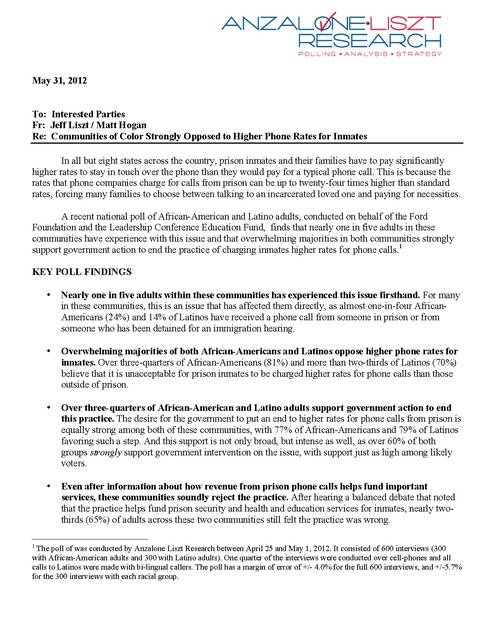Anzalone Liszt Key Poll Findings Prison Phone Prices May 2012
Download original document:

Document text

Document text
This text is machine-read, and may contain errors. Check the original document to verify accuracy.
May 31, 2012 To: Interested Parties Fr: Jeff Liszt / Matt Hogan Re: Communities of Color Strongly Opposed to Higher Phone Rates for Inmates In all but eight states across the country, prison inmates and their families have to pay significantly higher rates to stay in touch over the phone than they would pay for a typical phone call. This is because the rates that phone companies charge for calls from prison can be up to twenty-four times higher than standard rates, forcing many families to choose between talking to an incarcerated loved one and paying for necessities. A recent national poll of African-American and Latino adults, conducted on behalf of the Ford Foundation and the Leadership Conference Education Fund, finds that nearly one in five adults in these communities have experience with this issue and that overwhelming majorities in both communities strongly support government action to end the practice of charging inmates higher rates for phone calls.1 KEY POLL FINDINGS 1 • Nearly one in five adults within these communities has experienced this issue firsthand. For many in these communities, this is an issue that has affected them directly, as almost one-in-four AfricanAmericans (24%) and 14% of Latinos have received a phone call from someone in prison or from someone who has been detained for an immigration hearing. • Overwhelming majorities of both African-Americans and Latinos oppose higher phone rates for inmates. Over three-quarters of African-Americans (81%) and more than two-thirds of Latinos (70%) believe that it is unacceptable for prison inmates to be charged higher rates for phone calls than those outside of prison. • Over three-quarters of African-American and Latino adults support government action to end this practice. The desire for the government to put an end to higher rates for phone calls from prison is equally strong among both of these communities, with 77% of African-Americans and 79% of Latinos favoring such a step. And this support is not only broad, but intense as well, as over 60% of both groups strongly support government intervention on the issue, with support just as high among likely voters. • Even after information about how revenue from prison phone calls helps fund important services, these communities soundly reject the practice. After hearing a balanced debate that noted that the practice helps fund prison security and health and education services for inmates, nearly twothirds (65%) of adults across these two communities still felt the practice was wrong. The poll of was conducted by Anzalone Liszt Research between April 25 and May 1, 2012. It consisted of 600 interviews (300 with African-American adults and 300 with Latino adults). One quarter of the interviews were conducted over cell-phones and all calls to Latinos were made with bi-lingual callers. The poll has a margin of error of +/- 4.0% for the full 600 interviews, and +/-5.7% for the 300 interviews with each racial group.

